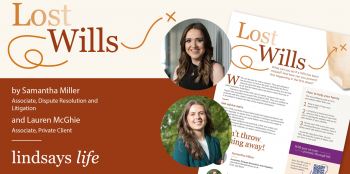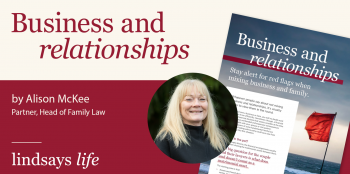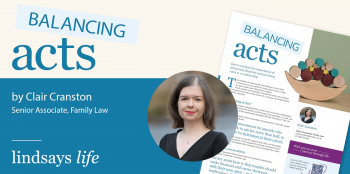The following article featured in the Scotsman on 9 October 2023.
Nina Taylor (Partner in our Family Law team) and her client, a father who battled for three-and-a-half years to secure proper contact with his son, both urge other separated parents not to give up.
This father shared his experiences as he and Nina highlighted concerns that too few children benefit from a full relationship with both parents following separation. They believe there are many who still subscribe to the old-fashioned concept that one parent should care for them full-time, and the other should see the children for a few hours at the weekend at most.
“That is an unhelpful attitude, both for the parent who is left with all the responsibility, and also for the parent who desperately wants to play a more meaningful role in their children’s lives,” said Nina.
“The best outcome for all concerned is when parents can continue to share the care of their children, so that decisions are made together and the children spend substantial quality time with each parent, including holidays.
“We unfortunately sometimes see a parent who is restricted in the time that they are allowed with their child will walk away from seeking an increase as there are so many common misconceptions - such as fathers having less rights than mothers.
“That’s not the case. Both parents have the same parental rights and responsibilities if they are both named on a child’s birth certificate.”
An estimated 30% of children in Scotland will experience family separation.
Nina says discussions over access can be difficult in the immediate aftermath of a break-up. She added: “Mediation can often assist in allowing people to talk about sensitive issues in a supported setting.
“Our experience is that most parents are able to look beyond adult issues and put the best interests of the children first. Sometimes, though, family lawyers deal with volatile situations where parents are entrenched and act unreasonably. A parent struggling to gain or maintain contact with a much loved child can often feel unsupported and at a loss. In those situations, legal advice is essential.
“At the end of the day, a court action can be raised to have care arrangements regulated and to make sure that one parent is not sidelined. Court is a last resort and can be very stressful but a good family law solicitor will work hard to minimise conflict and support a client.”
One dad - who has agreed to be identified as Alan to respect his family’s privacy - has shared his story in the hope that it makes other parents realise their rights. He separated from his former wife, with whom he shares a young son, in 2019. But it took until earlier this year to get the extensive contact to which he - and his child - were entitled to, in place.
Alan said: “It was hard - a long slog. It was not a nice situation and really upsetting at times. But getting access arrangements in place through the court has been worth it for me and my son.”
When he and his ex-wife separated, they tried organising contact themselves, but he was not getting the level of contact that was in the best interests of his son to allow a meaningful father/son relationship.
“It was really difficult - an emotional time. We were going through the end of a relationship and, at the same time, I went from seeing my son every day to only five hours a week,” Alan explained.
“Friends and colleagues who had been through similar situations told me this was not right. They told me I was going to need to speak to a lawyer. It was still a difficult system, but she fought really hard, bringing experience and an element of calm to the situation.”
Various avenues to reach an agreement were pursued between lawyers before Alan’s case ended up in court, and after a number of court hearings, final orders were granted. His son now lives with him for 15 days a month - five nights one week and two nights another, with supporting arrangements in place to cover holidays, ensuring the boy has shared time then with both parents.
“My son’s my best friend and he’s so happy now,” said Alan. “Going long periods without seeing him really affected my mental wellbeing - and I am sure it affected his too. The arrangements we now have in place bring routine and stability to all of our lives.
“Before my lawyer got involved, I was starting to feel disillusioned. I do not think there’s enough information out there for dads for them to understand what equal parental rights means. How many parents are out there who should be seeing their children more but are not because they have not had the right advice? I realised how wrong my situation was when things were explained to me. This was a horrible experience - something I never wish to go through again. But I am really grateful for the support I have received.”
Our family lawyers use a range of methods to help parents reach an agreement, including collaborative law and mediation.
Nina said: “Separation and divorce does not come with an instruction manual. It’s a difficult time, even more so when there are children involved. If you can come to an amicable, negotiated agreement, it often means that you can tailor the solution to fit your exact circumstances, giving you much more control over events than if you were in the hands of a court, where a decision can simply be imposed.
“In those situations, our job is to ensure they have the best advice possible. At the end of the day, everyone simply wants what’s best for their child, but this can sometimes be lost in the emotion of separation.”
Lindsays works with organisations including Consensus Scotland and CALM Scotland to offer relationship and mediation advice. For more details go to www.consensus-scotland.com and www.calmscotland.co.uk.
Access to children: Key legal rights explained
● Parents have the same rights and responsibilities when both are named on the birth certificate - one does not have rights which trump those of the other parent.
● A court will only intervene - and put in place care arrangements if necessary - in the event of a dispute.
● Any decision made by a court must have the best interests of the child as the priority.
Background / context:
● The latest UK Government figures show that, in the financial year ending March 2022, there were 2.5 million separated families in Great Britain, with four million children in those separated families.
● According to the Scottish Government's civil justice statistics for 2021-22:
○ An estimated 1% of adults in Scotland experienced a problem due to child contact, residence or maintenance (the same figure as those experiencing problems due to divorce and separation).
○ Cases during 2021-22 showed the most common issues in parental responsibilities and rights cases were: Contact (1,271), Residence of child (1,077) and Parental responsibilities and rights (514).
○ Divorce / dissolution and parental responsibilities and rights are the biggest family law case types, and together account for 94% of family cases initiated.






